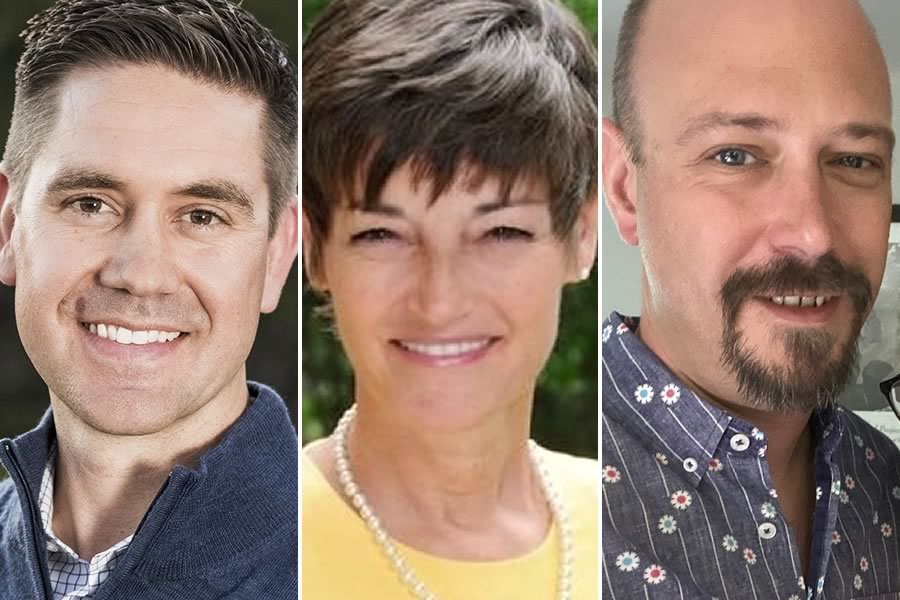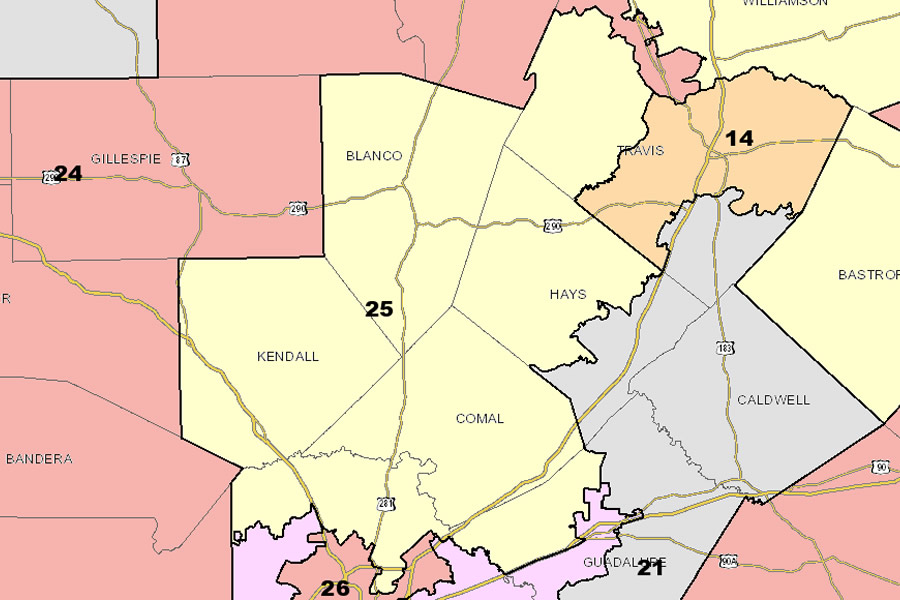Channon Cain
Donna Campbell
Robert Walsh
2022 Primary Elections
Excerpt published in February 19 New Braunfels Herald-Zeitung
Three candidates are running to represent Senate District 25. Incumbent Donna Campbell is being challenged by Channon Cain in the Republican primary. Democrat Robert Walsh is unopposed.

Senator Campbell’s Record
Unfortunately, Senator Campbell’s apparent interest in protecting Hill Country residents and our natural resources from freewheeling quarries and the aggregate industry seems to be a flash in the pan. While she introduced a few decent quarry-related bills in 2019 (none passed), her track record of supporting legislation unfriendly to Texas citizens is disappointing.
Repeated contributions from TACA, Vulcan, and other APOs to Campbell’s campaigns over the years are concerning. Furthermore, it is telling that her senior policy advisor during the last session is now a government relations manager for Vulcan Materials.
Despite our open-door policy and hundreds of thousands of Hill Country residents desperate for support, Dr. Campbell was unhelpful during the past legislative session. Her reluctance to collaborate on development of real, meaningful solutions to the problems District 25 residents face is disheartening.
Challengers from the Right and Left
Channon Cain, from the Austin suburb of Lakeway, is also running in the Republican primary. He took the time to respond to our candidate questionnaire and sees the need for some protection of residents’ property values and quality of life from the negative impacts of aggregate operations in the Texas Hill Country.
Robert Walsh, Democrat from San Antonio, describes protecting our environment as “crucially important” and makes it a top three issue on his campaign website. He looks forward to the sunset review process for TCEQ as a prime opportunity to implement badly needed reform.
Robert Walsh would be a strong supporter of our organization and our efforts to protect the air, water, and natural resources of the Texas Hill Country.
Early voting begins on February 14 and election day is March 1, 2022. Visit the Comal County Elections webpage or VoteTexas.gov for polling locations and sample ballots. Candidate responses to our questionnaire are listed below.
Candidate Questionnaire
Preserve Our Hill Country Environment sent a candidate questionnaire to both candidates in January, then followed up with each candidate. Responses from each candidate are shown below verbatim. As per instructions, responses have not been edited for spelling, punctuation, or grammatical errors. “No response received” is shown for any candidate who did not reply.
Question 1. During the 2019 and 2021 legislative sessions, nearly one hundred bills related to quarries, aggregate production operations (APOs), water resources, and TCEQ permitting were introduced. Unfortunately, very few were passed into law. The House Interim Committee on APOs issued a report on the industry in January 2021. Would you author and actively champion legislation identical or substantially similar to HB 509, HB 2871, and/or HB 3798 (86th Texas Legislature)?
Cain: YES. I want Texas to be the best place to raise a family and the best place to do business on the planet. This means having a healthy economic environment and healthy communities. In instances such as these, we must have a proper buffer between the two, and I would be willing to support legislation that provides this. Specifically, Kyle Biedermann’s bill, HB 3798, in the 86th Texas Legislature would help safeguard families, communities, and businesses. I would not support anything that obstructs legitimate business interests, but providing this buffer is good for both. I also support Representative Biedermann’s emphasis on both reclamation and air quality. This would ensure homeowners’ property values and quality-of-life are not negatively impacted.
Campbell: No response received.
Walsh: YES. It’s long past time we take action to protect our communities from these extractive industries. I would definitely author and champion bills like the above. The TCEQ is a regulatory agency in industry capture, and we need robust reform during the Sunset process in addition to specific legislation.
Question 2. Does the Texas Commission on Environmental Quality (TCEQ) have major, systemic problems related to regulation and permitting of APOs such as quarries, concrete batch plants, asphalt plants, and similar facilities? If so, what are the biggest issues, what needs to be done to solve them, and how would you help?
Cain: YES. Yes, the Texas Commission on Environmental Quality (TCEQ) does have major, systemic problems related to regulation and permitting of APOs such as quarries, concrete batch plants, asphalt plants, and similar facilities. The biggest issue is that the organization is not protecting families and communities health as they are supposed to do when it comes to regulation and permitting of APOs. More transparency in the permitting process and more local control of issues would help. I would be willing to stand up for the families and landowners in my district and sponsor legislation.
Campbell: No response received.
Walsh: YES. The TCEQ has put much more focus on producing permits than musclarly enforcing its mission. The only actions they have taken are to make permitting easier, by their own admission in Sunset.
Question 3. Vulcan Construction Materials will likely soon submit a Water Pollution Abatement Plan (WPAP) for their proposed 1500-acre quarry in Comal County. Water quality and supply are vital to District 25—both as a foundation for the local tourism industry as well as for human consumption, agriculture, and wildlife. Heavy industrial operations, quarries, and mining directly over the environmentally sensitive Edwards Aquifer recharge and contributing zones endanger one of our most precious natural resources—water. When Vulcan submits their WPAP for this facility, how, specifically, would you be involved and what actions would you take as a state senator?
Cain: As State Senator for District 25, I can promise to be fair, responsive, and decisive when I review such proposals as a Water Pollution Abatement Plan (WPAP) for Vulcan Construction Materials that is proposed for their 1500-acre quarry in Comal County. Protection and preservation of our water supplies is paramount—both for communities and for the local tourism industry that thrives on people who come to recreate in the Hill Country. My objective is to make Texas the best place to raise a family and the best place to do business in the world. I will stand up for Texas families and protect them and their communities.
Campbell: No response received.
Walsh: My plan would be to get as involved as possible in public comment and build a coalition around the local leaders doing review (in the Technical Review process). Without knowing their mitigation strategy, I can say that I would bring some strong skepticism and work to make sure it is extremely robust.
Question 4. Eminent domain has recently been used by a Vulcan subsidiary, Southwest Gulf Railroad, to condemn properties that Medina County landowners refused to sell. Now this Vulcan company has built a nine-mile railway to connect a quarry to the Union Pacific line. In Hill Country counties just to the north, Kinder Morgan has used eminent domain to seize land and easements for their Permian Highway Pipeline. What specific actions would you take to help correct the imbalance of power between large corporations and their lobbyists, and regular citizens and landowners when it comes to property rights and eminent domain condemnation?
Cain: Private property rights are central to Texas and American values and these could be strengthened with more local control in these situations. I will make certain private land owners private property rights are prioritized and protected and that eminent domain only every occurs as a last resort in matters of absolute necessity with no plausible alternative. In the event of eminent domain, private property owners should be compensated for full fair market value, including reasonable damages.
Campbell: No response received.
Walsh: I would support legislation that would bar this use of eminent domain completely.
Question 5. The mission of Preserve Our Hill Country Environment is to preserve, protect, and restore the land, water, air, wildlife, unique features, and quality of life in the Texas Hill Country against the aggressive and insufficiently regulated expansion of the aggregate industry. Considering our mission and the interest of our over 5,000 members, followers, and supporters, why do you think you are the best person to represent District 25?
Cain: We choose to live in the Hill Country because it is a unique and beautiful part of Texas. The small town, farming and ranching culture of SD25 must be protected, and the iconic landscape of the Hill Country must be preserved. My family and I regularly, camp, fish, hunt, tube, hike, bike, swim, run, boat, and spend the day in the outdoors of the Texas Hill Country. I want to preserve this way-of-life for my children and generations to come. I will do what is necessary to protect private property rights, stand up for communities, and make sure families stay safe and healthy in Texas and in SD25.
Campbell: No response received.
Walsh: We must preserve this land for our children and their children. The aggregate industry has fully captured the TCEQ, and without fully utilizing the Sunset process and further, broadly supported legislation, they will continue to. I believe I’m the only candidate in the race that can or will say so, and will act on this, and so I would appreciate your votes.

Preserve Our Hill Country Environment is a 501(c)(4) nonprofit organization formed to preserve, protect, and restore the land, water, air, wildlife, unique features, and quality of life in the Texas Hill Country from the aggressive and insufficiently regulated expansion of the aggregate industry.
Related News
Wonders Down Under Dinner & Auction
February 15, 2025
Tuesday, April 1, 2025: Sixth annual fundraising dinner and auction in the Hidden Wonders Cavern at Natural Bridge Caverns. Fabulous meal, local libations, and silent auction.
Bracken Cave Bat Experience
July 21, 2024
August 27, 2024: Experience the spiraling emergence of over 15 million Mexican free-tailed bats—the largest bat colony on the planet—as they begin their evening hunt.
Blatant Disregard by TCEQ for Our Water Supply and the Health and Welfare of Texas Hill Country Residents
July 11, 2024
Texas Commission on Environmental Quality (TCEQ) has approved the Water Pollution Abatement Plan (WPAP) for proposed Vulcan quarry. Why that’s a bad thing and what we can do about it.